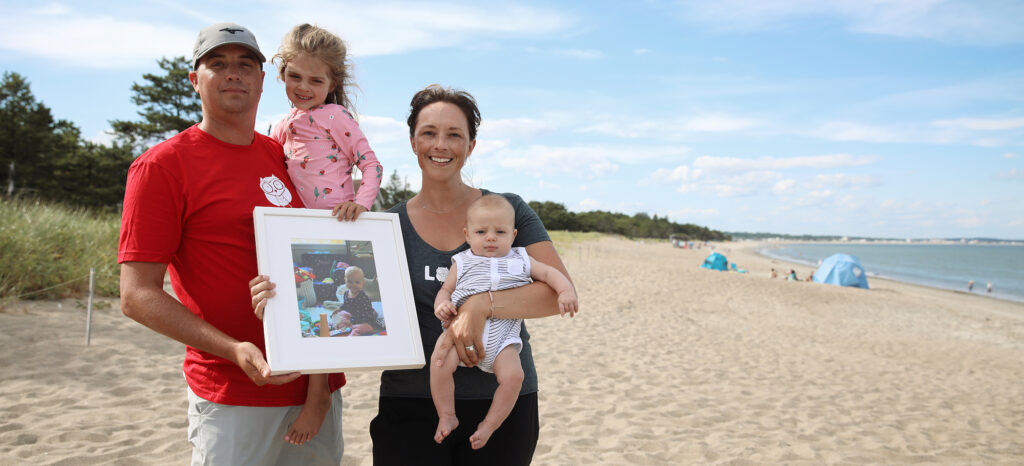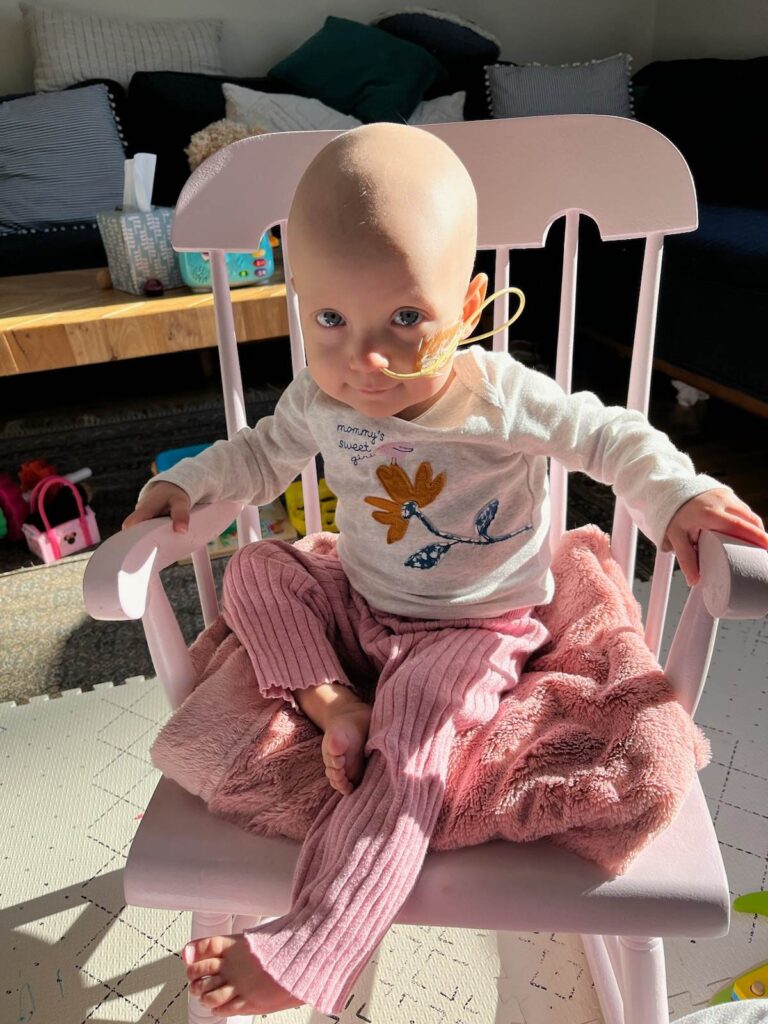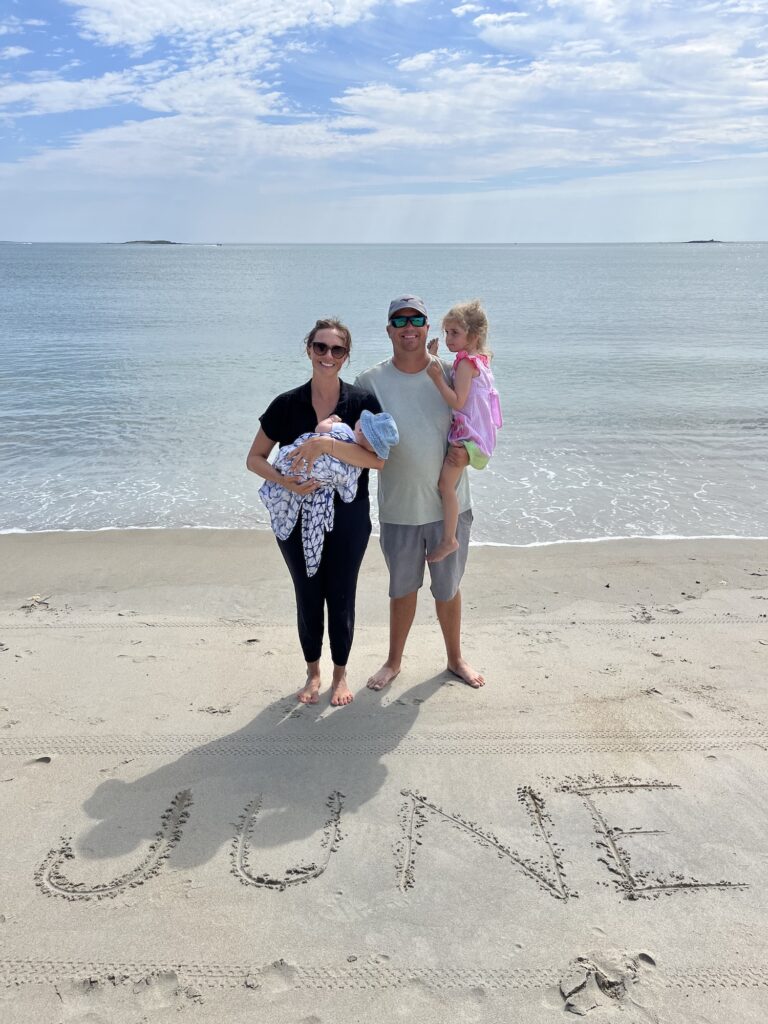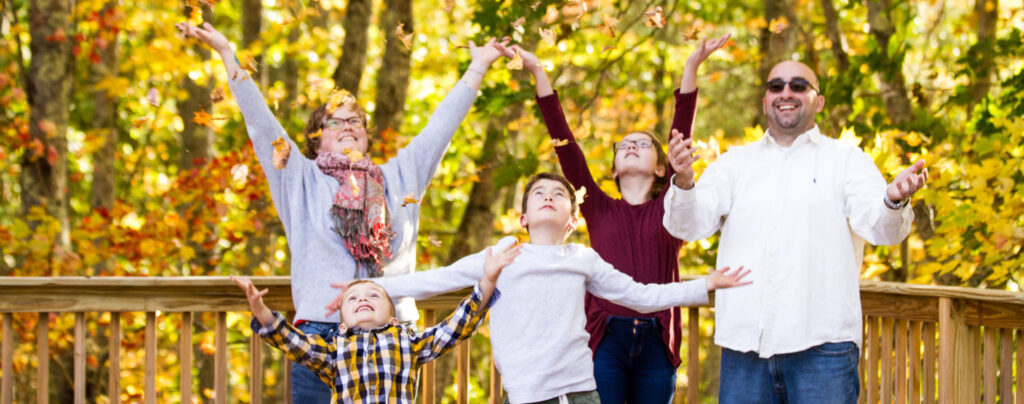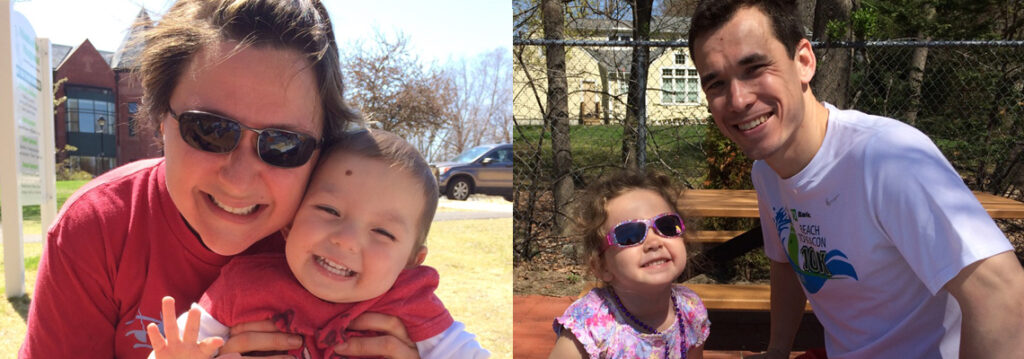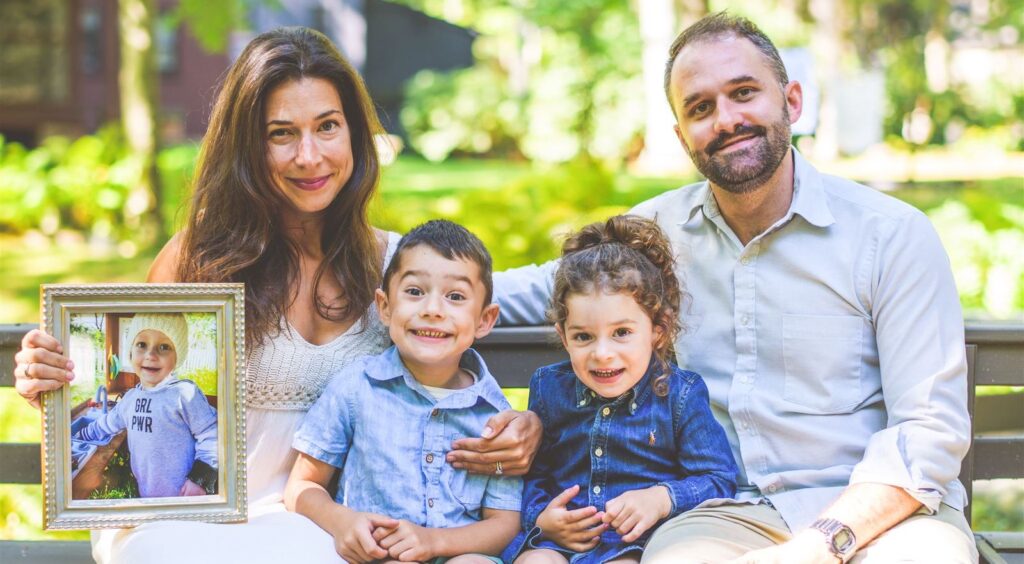
How did you find out about your child’s diagnosis? Tell us about your experience pre-diagnosis including symptoms and doctor’s visits.
The first year with Laurel was beautiful.
We noticed when she was about 10 months old that she was easily fatigued and very picky when it came to food. Our pediatrician in Plymouth, MA dismissed our concerns. Her weight loss was described instead as her “being svelte and having great genes.” At her one year appointment, her pediatrician massaged her abdomen and Laurel shrieked, to which the doctor replied, “she must know she is about to get her shots.”
A week later, a softball-sized mass was discovered on her left adrenal gland at Children’s Hospital. I had rushed her there as I knew that something was seriously wrong – despite said pediatrician assuring me she was fine. Because Laurel was so sick upon arrival, she was intubated for a week in the ICU and that’s when we began chemotherapy. We stayed in the ICU for 42 days until we were transferred to the Pediatric Oncology floor.
What did receiving the devastating news of your child’s serious illness feel like for your family?
We didn’t receive all of the news at once, but over the course of a few days, we learned that the mass was cancer, that it was Neuroblastoma in its most malignant form, and that it had spread to her bones. I had a feeling at that point that she wasn’t going to make it. I stood over her crib in the ICU for 2 weeks without glasses on in the same outfit while she was intubated. I’m not sure if I prayed or bartered with a higher being. I told my husband that if she died, I would die too. A month later, I learned I was pregnant with our son. He saved me from taking my life.
How did your child’s treatment progress? Describe one or two of the hardest moments. If you can, tell us a bit about their final days and end of life.
Laurel’s treatment was excruciating to bear witness to. It pains me to even have to pick one or two hardest moments – I can think of two times where I howled crying for my dying child.
The first moment was after 3 months of intense chemotherapy when she was getting scanned so that we could make sure that the bone cancer subsided in order for us to progress with the next stage of treatment – Stem Cell Therapy. The scan was taking a really long time. She was sedated and they had to re-sedate her to keep scanning. Because my husband worked in MRI (at Boston Children’s Hospital at the time- go figure), he knew that something was seriously wrong. Her Neuroblastoma doctor came to the waiting room and told us that her cancer had only spread – that the chemotherapy had done nothing. What we had put our child through – all of the hell and agony of watching your kid throw up, lose hair, become a skeleton – all of this treatment had done nothing. The cancer was too aggressive. This was considered a “relapse” and the doctors gave her a 10% chance of living. I called my mom because she expected us home much earlier from the scan, and I howled and cried that she was dying, that Laurel was dying and we couldn’t save her, My belly was starting to show with her new baby brother and I wept uncontrollably for hours and days. That’s when I knew she wouldn’t make it. She lived another 11 months through integrative therapies (novel immunotherapy treatments and naturopathy).
The second hardest moment was a few short weeks after finding out she relapsed, I left her room to meet a best friend that had dropped off a care package for us. My husband was standing with Laurel – she was hooked up with a chemotherapy IV and she reached for something and fell down on the floor. Although I wasn’t there, it was like any toddler fall. But because her bones were so brittle, she ended up breaking her left femur (thigh bone). The resident doctor on the floor refused to schedule us an X-Ray, despite Laurel crying in pain. She instead ordered Tylenol and got an ice pack. My full mama bear rage came out – I told this resident, “F your ice pack, order her an X-Ray now.” She saw in my eyes that I was not going to back done. The X-Ray revealed a full fracture and Laurel was placed in a full spica cast that immobilized her hips and legs. She could not walk and had to be picked up to be moved for 6 weeks. She wore a diaper that I could not change because the cast was in the way and keeping her clean was very difficult, but I committed myself to making sure she did not get any skin infections or chafing. I was almost 6 months pregnant carrying Laurel around on my hip in August. We could not travel or bring her to the beach. It was so hard to watch Laurel go through this on top of everything else. She finally had the cast cut so that I could remove the top half and it like a Velcro contraption. One day, my mom’s good friend visited me to help with household tasks. She raised 6 children herself and a very seasoned mum. She knew that Laurel had another 2 weeks to go in the cast, per the doctors orders, but said to me softly, “Leah, let’s remove the cast and let her legs rest.” Laurel, as sick as she was, was so excited to take that cast off. First she laid flat, rolled around, and then got up to walk without question. I remember being able to bathe her for the first time without that spica cast and it was one of the happiest moments for us both!
Laurel was doing well with immunotherapy – she had about 12 rounds of it and it helped her Curie score (how prevalent her cancer was in her bones) decrease from a 17 at relapse to a stable 8 at Easter time 2018. We noticed though that she seemed to have increase leg pain. During a stay for immunotherapy, the team ran her vitals and noticed that she had more white blood cell blasts in her blood – this was a sure sign of another cancer, AML. Laurel was then diagnosed with an extremely rare cancer called MLL, which was *caused* by a chemotherapy drug, Etoposide. Treating AML and Neuroblastoma was like treating apples and oranges. From the date we received the secondary diagnosis to when she died, it was only 21 days. We decided to take her home to our little beachside home. She was on oxygen for a week and we had family and friends visit her. Someone gave her a beautiful bouquet of flowers and she took each flower out and handed individually to all of our people visiting her.
Laurel died in our bed between my husband and I in the early morning of June 15, 2018. We were up with her the night before, singing songs and reading and telling her she was the love of our life. I must have drifted off to sleep around 4 am. My husband stayed up with her and he watched her to take her last breath. He closed her eyes and woke me up to tell me she was gone.
I couldn’t believe how peaceful she looked when I cleaned her face and removed her breathing tube and the tape that held it to her. I washed her little cheeks and face and put her in a dress her aunt made her. We slowly took all the flowers we received in the home and placed them around her. We lit candles and said prayers and spoke to her and had to let her go. When someone came from the funeral home to pick her up, she carried Laurel in a blanket our family made her, flowers all around her, and our Newfoundland escorted Laurel to the van. It was the most devastatingly beautiful release of my life.
What made your child unique? What were some of your child’s favorite things to do during treatment? Did they have heroes, sources of comfort & joy?
Before Laurel was sick (and even after too), strangers would stop me and tell me how she looked like “an old soul” with those big eyes. Laurel was kind and gentle. She always gave things away. She loved ladybugs and pointed them out in books or whenever she saw one.
Laurel loved to dance and wiggle. Despite everything she went through, she only wanted to smile and comfort us.
Before she passed away, her Dad tucked her in one night and she touched his face with both hands and said clearly, “I’ll miss you Dad.” She was only 26 months old.
How are you dealing with your grief? How are your surviving children or partner managing now? What are some of the things that help your family keep going?
I’m in my 4th year of bereavement this year and I am finally able to live the day-to-day without intense rage and anger for what happened to our sweet Laurel Pearl. My anger ruled my life for a few years. I remember being unable to see children for a long time, I could not even look at a family or friend’s child. I became pregnant with our third baby, Julia, three months after Laurel’s death. My pregnancy kept my sober – it allowed me to process what had just happened with a clear head. After Julia was born in 2019, I went on and off antidepressants to just get through the day. So much had happened in so little time, but it became better for me to feel these emotions instead of numbing them out with medication.
Our family keeps going because it’s simple – what is the other option? I can’t spend the rest of my days living in a dark basement wallowing in my grief. Boden and Julia deserve a happy childhood and the best from their parents. My husband and I pledged to keep going no matter what. Yes, it gets very difficult and the grief of our former life and the questioning of the “what could have been” is hard to not get wrapped up in.
There was one moment I remember though – and this is a moment I will never forget. We were inpatient in December 2017 and Laurel was asleep in the hospital bed. I crept out of the bed and went to wash my face. I was standing in the bathroom, 9 months pregnant and my face was probably looking ravaged and tired. I remember looking into the mirror and telling myself, “you are doing this – you are giving it your all – no matter what happens, she knows how much you love and care for her. Keep going, Leah.” And so, I did. That moment was a pivotal point in my life as a young mom. I forgave myself and God or Buddha or higher power. I acknowledged how hard it was and how hard it would be going forward. I surrendered.
Do you have any advice for a family facing the end-of-life of their child? What helped you most? Are there any organizations that we can share as resources to other families?
Well, I know not every family can take their child home, but that decision brought my husband and I great peace. I also decided not to bury Laurel, instead she was cremated. I think about that now as we have moved different states and I am able to keep her close to me. We had a porcelain vessel made to hold her, ordained with gold and turquoise. It reminds me of the Sea, of Moana, of Laurel.
How has finding Rett’s Roost been helpful to you?
The Roost has taught me to process Laurel’s death in a holistic way. It has allowed me to meet other bereaved cancer moms and dads that I would otherwise not have known. I learned that I don’t have to go through this grief journey alone and I do not have to feel terrible inside for all of the trauma we went through.
My heart and soul are aligned with Rett’s Roost’s mission. We will grieve as parents for the rest of our lives. But we must forgive ourselves at some point and this organization has helped rebuild my mind, body, family, and community.

